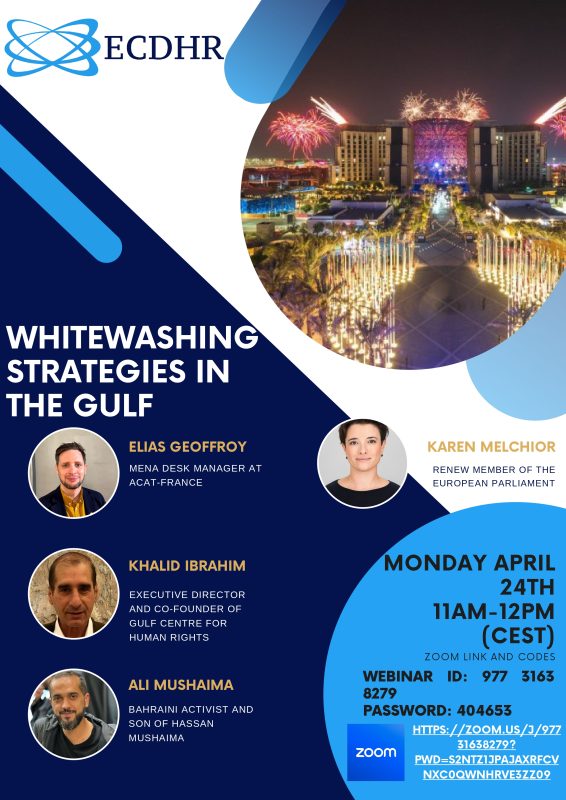On Monday, April 24th, the European Centre for Democracy and Human Rights (ECDHR) organized a webinar entitled ‘Whitewashing Strategies in the Gulf’, focusing on the whitewashing strategies that Bahrain and Saudi Arabia have been using to conceal domestic political repression and human rights violations. Moderated by Cindy Zheng and Daniele Sabato, advocacy assistants at the ECDHR, the webinar relied on the insights of three panelists, namely Karen Melchior, a Danish Member of the European Parliament (MEP), Elias Geoffroy, the MENA Desk Manager at ACAT-France, and Ali Mushaima, a former Bahraini political prisoner and son of the Bahraini opposition leader Hassan Mushaima.
Whitewashing is an infamous practice used by governments to exploit media attention and distract the public from human rights violations and abusive practices. In the Gulf, this includes hosting cultural and sports events, controlling online information visibility, and securing economic support for political gain. Whitewashing strategies can also be influential through investments in Football teams in the United Kingdom or France, also known as sportswashing. Indeed, every country wants to promote a modern image, and to be seen as a tolerant country, nevertheless, according to Ms Karen Melchior, “we need to be aware that the promotion of countries and cities needs to be the promotion of something that is at the core, at the essence of that country, otherwise it becomes hollow, and you cannot promote something effectively that is not true”. For instance, Saudi Arabia has been promoting women’s football, which can be ironic considering its poor record on women’s rights. Despite continuous efforts from human rights organizations to pressure the organizers of sports or cultural events to, at least, condition their relationships with Gulf countries under human rights commitments, the respectability and popularity these countries enjoy has deterred international sporting bodies from reconsidering holding events in the region.
One important point raised in the discussion highlighted the easiness with which these authoritarian regimes can engage in whitewashing strategies. This is mainly due to the weakness of accountability mechanisms in these types of political systems and the tight grip the governing powers have over the country’s resources. In Bahrain, the ruling family’s control over and use of the sports sector perfectly displays this phenomenon. Ali Mushaima described how Bahrain’s Crown Prince Sheikh Nasser bin Hamad al-Khalifa, being the chairman of the Supreme Council for Youth and Sport and President of the Bahrain Olympic Committee, uses the enormous power in his hands to “sportswash” Bahrain’s record of systematic political repression and human rights abuses. Indeed, he instituted in 2004 the construction of the Bahrain International Circuit, which hosts the Formula 1 (F1) Grand Prix, and launched the Endurance 13 triathlon team in 2015 and a cycling team in 2017. Nasser thus uses his status as Crown Prince to manage the country’s resources as he pleases, thereby initiating major sports events that put Bahrain under the international spotlight, while each year thousands of Bahraini citizens who dare to demand more rights and democratic reforms are systematically imprisoned and abused. Ali added, however, that Bahrain’s sportswashing strategies would not be possible without Western businesses’ complicity. The whitewashing of human rights violations is a dual policy between Bahrain’s ruling family and international sports organizations like the Fédération Internationale de l’Automobile (FIA) and F1, who are well aware of the country’s appalling human rights record but decide to turn a blind eye in the name of business.
Human rights abuses are also constantly dismissed by Western powers, some of which sell arms and foster relations with Gulf countries. Elias Geoffroy underlined the role of France in its diplomatic relations with Saudi Arabia. In December 2021, in the context of the French president’s diplomatic tour in the Gulf, Emmanuel Macron became the first European leader to break up the unofficial diplomatic ban implemented against Mohammed bin Salman following the assassination of the journalist Jamal Khashoggi in October 2018. Macron defended himself by justifying that it was “necessary to talk to Saudi Arabia, the biggest country in the region, needed for the stability of the region”, but “it doesn’t mean we’re complicit”. However, France has not been very vocal regarding the whole human rights situation in the Kingdom, including its involvement in the Yemen War, in which France is implicated since it continues to sell weapons to Saudi Arabia. France also has close diplomatic and economic partnerships with Saudi Arabia. Indeed, France’s involvement in the Saudi strategic framework of Vision 2030 and the creation of the French Agency for Alula development benefit the French entertainment and touristic sector, covering systematic human rights violations in the Kingdom.
In the Q&A session, the discussion went deeper into the possible ways of conditionalizing countries’ and businesses’ relations with Gulf countries on human rights commitments. According to Elias Geoffroy, this represents a puzzling issue, since, even if a harmonized approach towards the Gulf was to be introduced under EU legislation, it would be challenging to implement as in France, for example, courts struggle to ensure the government respects EU regulations. The application of targeted sanctions under the EU Global Sanctions Regime can hold officials from GCC countries accountable, however, according to MEP Karen Melchior, its efficiency is not as advanced as the US’ and Canada’s Magnitsky Legislation, as all EU member states need to agree in order to apply these sanctions. Notwithstanding, civil society organizations should continue pressuring businesses and governments through public campaigns.
The webinar shed light on the strategies adopted by Bahrain and Saudi Arabia to conceal domestic political repression and human rights violations. The panelists highlighted the role of these authoritarian regimes in engaging in whitewashing strategies and the complicity of Western countries in facilitating these strategies. Despite the challenges, the panelists emphasized the importance of continuous engagement with human rights organizations and political actors to address human rights abuses in the region.

